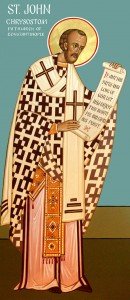 In the last issue I shared with you St. John Chrysostom’s concept of the condescension of God involved in His Incarnation. His concept involved a distinction between the essence and energies of God. In this there is a remarkable resemblance between his concept and that of Basil the Great. I realize that to many this makes very little sense. This involves how they thought about God. God by His essence, is a being which is truly beyond our comprehension. We can say things about Him but, in truth, we cannot truly understand what type of being He is. All we can say, in truth, is what He is not. This is the true Eastern Christian approach. God, we must say, is not limited and that all the powers that are His are beyond any limitations. He is limitless and everywhere at the same time. There is no time in Him and His powers are greater than any powers of humankind. Truly His consciousness pervades all things and He creates out of nothingness, or by a simple act of His will, expressed in His Word.
In the last issue I shared with you St. John Chrysostom’s concept of the condescension of God involved in His Incarnation. His concept involved a distinction between the essence and energies of God. In this there is a remarkable resemblance between his concept and that of Basil the Great. I realize that to many this makes very little sense. This involves how they thought about God. God by His essence, is a being which is truly beyond our comprehension. We can say things about Him but, in truth, we cannot truly understand what type of being He is. All we can say, in truth, is what He is not. This is the true Eastern Christian approach. God, we must say, is not limited and that all the powers that are His are beyond any limitations. He is limitless and everywhere at the same time. There is no time in Him and His powers are greater than any powers of humankind. Truly His consciousness pervades all things and He creates out of nothingness, or by a simple act of His will, expressed in His Word.
So, as you see, He is truly beyond our human comprehension. All we can do, however, is see Him in His energies or actions. We see a dynamic universe which is constantly in motion and filled with energies of all sorts. Our God must be dynamic and yet never changing, if you can understand that. We can only know Him through His creation. His creation is dynamic, possessing the qualities of beauty, intelligence, instinct and structure. As we gain insight into the universe, we see that it is limitless and yet it is also individualized.
The scriptures attempt to find language to express Who God is. The revelation of Tabor truly demonstrates that the language which Scripture employs in order to describe the revelation of God to man should not be interpreted literally, but, rather, as St. John puts it, it should be understood “in a manner befitting God.” Thus we should raise our minds to the meaning that the words of Scripture seek to convey. According to John, therefore, Scripture likens the Light of Tabor to the sun and snow because there is nothing brighten within the realm of human experience to which this particular light might be likened. John is thus not interested in metaphor or figurative language. He was not given to an allegorical interpretation of Scripture, which makes his interpretation all the more striking.
John describes the light of Tabor, which is meant to give humans an experience of the Godhead, as a Light even greater than the experience of the Sun which shines upon earth.
